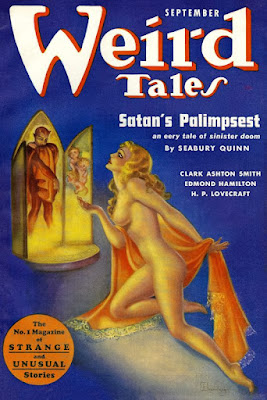Loath though I am to agree with the dread satrap Pharnabazus – one of H.P. Lovecraft's satirical nicknames for Wright – I can't deny that "The Death of Ilalotha" is very weak as a story, especially when compared to many of Smith's more celebrated efforts. It's still an enjoyable read, both for its unparalleled use of language and the mood it conjures, but one should not expect to be wholly satisfied with its plot, which remains quite weak. Rather than a "story," I might instead call "The Death of Ilalotha" a "situation" – and an unnerving one at that.
The piece begins with the funeral observance of the titular Ilalotha, whom we learn was a lady-in-waiting to "the self-widowed" Queen Xantlicha of Tasuun. According to the customs of Tasuun, funerals lasted several days and were the "occasion for much merrymaking and prolonged festivity."
For three days, on a bier of diverse-colored silks from the Orient, under a rose-hued canopy that might well have domed some nuptial couch, she had lain clad with gala garments amid the great feasting-hall of the royal palace in Miraab. About her, from morning dusk to sunset, from cool even to torridly glaring dawn, the feverish tide of the funeral orgies had surged and eddied without slackening. Nobles, court officials, guardsmen, scullions, astrologers, eunuchs, and all the high ladies, waiting women and female slaves of Xantlicha, had taken part in that prodigal debauchery which was believed to honor most fitly the deceased.
Only Clark Ashton Smith could write the phrase "funeral orgies" without its seeming laughable. From his pen, it seems not only natural but fitting, especially in light of the morbid melancholy of Zothique. In the midst of describing the licentious festivities, CAS takes a moment to comment on the deceased.
With half-shut eyes and lips slightly parted, in the rosy shadow cast by the catafalque, she wore no aspect of death but seemed a sleeping empress who ruled impartially over the living and the dead. This appearance, together with a strange heightening of her natural beauty, was remarked by many; and some said that she seemed to await a lover's kiss rather than the kisses of the worm.
I trust no one will be surprised to learn that these comments are not idle ones.
We soon discover that also present is Lord Thulos, "acknowledged lover of Queen Xantlicha," who had been away and only just arrived. He was thus unaware of the nature of the festivities. Prior to his having taken up with the queen, Ilalotha had been the paramour of Thulos and, "it was said, had grieved more passionately over his defection than any other."
Thulos, perhaps, had abandoned her not without regret: for the role of lover to the queen, though advantageous and not wholly disagreeable, was somewhat precarious. Xantlicha, it was universally believed, had rid herself of the late King Archain by means of a tomb-discovered vial of poison that owed its peculiar subtlety and virulence to the art of the ancient sorcerers. Following this act of disposal, she had taken many lovers, and those who failed to please her came invariably to ends no less violent than that of Archain.
Seeing his obvious sadness upon viewing Ilalotha's dead body, Queen Xantlicha approaches Thulos and warns him that "men say she was a witch." He cannot believe this, for he knew her well. Xantlicha continues to assert the truth of her charge, adding that Ilalotha had died "from no other fever than that of love."
"It was from love of thee," said Xantlicha darkly; "and, as all women know, thy heart is blacker and harder than black adamant. No witchcraft, however potent, could prevail thereon." Her mood, as she spoke. appeared to soften suddenly. "Thy absence has been long, my lord. Come to me at midnight: I will wait for thee in the south pavilion."
With the queen gone, Thulos turns his attention once again to Ilalotha. He then begins to imagine that she is not dead, that she has just kissed him, and that she calls to him with outstretched arms. "Come to me at midnight. I will await for thee … in the tomb," he hears her say. Though Thulos doubts what he has just imagined, he cannot be certain that it was a mere hallucination. What if the queen is right and Ilalotha was a witch. If so, she would surely have found a way to escape even death. He had to find out, even if it meant failing to keep his assignation with Xantlicha at the same time.
"The Death of Ilalotha" is a "poisonous little horror," as Smith described it, full of creeping dread and intimations of doom, not to mention luxurious language. The narrative itself is slight but I doubt anyone will mind, given its brevity. One reads Clark Ashton Smith for his ability to set a scene and induce unsettling – yet somehow still pleasurable – feelings in his readers. "The Death of Ilalotha" easily delivers that and more.


The ending of this tale is so disgusting. Since it’s horror, I mean that as a compliment. A classic! Too bad Smith never lived to see ‘80s heavy metal album covers or Rick-Baker-style SFX horror movies.
ReplyDelete